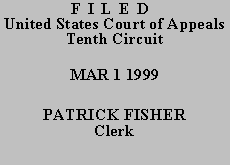

| CORALEE BAILEY, | No. 98-8074
(D.C. No. 97-CV-1051) |
"We review the grant or denial of a motion for summary judgment de novo, applying the same legal standard used by the district court pursuant to Fed.R.Civ.P. 56(c)." Seymore v. Shawver & Sons, Inc., 111 F.3d 794, 797 (10th Cir. 1997) (citation omitted). Summary judgment is appropriate "if the pleadings, depositions, answers to interrogatories, and admissions on file, together with the affidavits, if any, show there is no genuine issue as to any material fact and that the moving party is entitled to judgment as a matter of law." Fed.R.Civ.P. 56(c). Furthermore, we may affirm the district court's decision "on any grounds for which there is a record sufficient to permit conclusions of law." United States v. Sandoval, 29 F.3d 537, 542 n.6 (10th Cir. 1994). The party that appeals a grant of summary judgment must present more than conclusory allegations to establish the existence of a genuine issue for trial. See Setliff v. Memorial Hosp., 850 F.2d 1384, 1392 (10th Cir. 1988).
First, we dismiss appellant's claim that the College violated the "Age Discrimination Act," which the district court failed to address. Even if this claim was not waived because of appellant's failure to appeal the issue, and even if we construe her pro se complaint liberally, appellant has failed to identify a federal or state statute that would provide her with relief for the discrimination she alleges.
Next, we affirm the district court's conclusion that appellant failed to comply with the statute of limitations for all of her remaining claims except her claim of breach of contract. See Bailey v. Casper College, No. 97-CV-1051-B, at 4 (D. Wyo. Aug. 4, 1998). On appellant's state fraud and tort claims, the statute of limitations is four years. See Wyo. Stat. Ann. § 1-3-105(a)(iv) (Michie 1997). Furthermore, the statute of limitations on appellant's § 1983 due process and § 1985 conspiracy claims is also four years. See Wilson v. Garcia, 471 U.S. 261, 276 (1985) (holding that the statute of limitations of state tort law applies in § 1983 claims); Crosswhite v. Brown, 424 F.2d 495, 496 & n.2 (10th Cir. 1970) (same for § 1985 claims).
Under Wyoming law, the statute of limitations begins to run when a plaintiff knows or has reason to know that a cause of action exists. See James v. Montoya, 963 P.2d 993, 995 (Wyo. 1998). Although appellant's brief alleges that the district court either perpetrated or was the unwitting victim of fraud in the presentation of incorrect facts as uncontroverted evidence, the district court correctly found that the statute of limitations accrued when she learned in April 1993 that she was to be expelled from the nursing program. Appellant filed her complaint on September 15, 1997. Even if we were to assume that appellant's due process claim was tolled while she pursued the College's internal administrative procedures, upon reviewing the record, we would affirm the district court's finding that the process afforded by the College was "overwhelmingly adequate." Bailey, No. 97-CV-1051-B, at 8. Therefore, the majority of her claims are barred by the statute of limitations.
As for appellant's breach of contract claim, we affirm the district court's finding that the College's expulsion of appellant for failing to meet its academic requirements did not constitute a breach of contract. See id. at 9.
We therefore AFFIRM the district court's grant of summary judgment.
The mandate shall issue forthwith.
ENTERED FOR THE COURT
Carlos F. Lucero
Circuit Judge
*.The case is unanimously ordered submitted without oral argument pursuant to Fed. R. App. P. 34(a)(2) and 10th Cir. R. 34.1(G). This order and judgment is not binding precedent, except under the doctrines of law of the case, res judicata, and collateral estoppel. The court generally disfavors the citation of orders and judgments; nevertheless, an order and judgment may be cited under the terms and conditions of 10th Cir. R. 36.3.